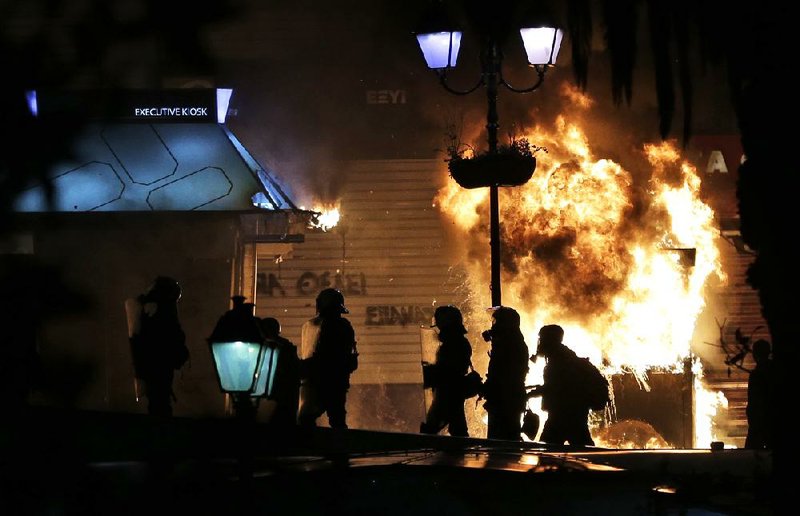ATHENS, Greece — An anti-austerity demonstration in Athens turned violent Wednesday as protesters clashed with riot police before Parliament approved a crucial new package of spending cuts.
The vote was the toughest test yet for the country’s 4-month-old coalition government, which approved the $17 billion package to ensure Greece continues receiving bailout loans and avoids bankruptcy.
“Today we must confirm Greece’s new credibility,” Prime Minister Antonis Samaras said. “We choose whether we want to stay in the eurozone ... or return to the drachma. That is the choice.”
The measures will pile more pain on the Greeks, who have suffered waves of spending cuts and tax increases since their government revealed in 2009 that public debt was far higher than officially declared.
On Wednesday, hundreds of rioters hurled rocks and gasoline bombs at lines of police guarding Parliament, who responded with volleys of tear gas and stun grenades, and the first use of water cannons in Greece in years.
Some in the estimated crowd of 80,000 protesters, who braved sometimes torrential rain, ran for cover as running battles broke out with police. Clouds of tear gas rose from Syntagma Square.
The prime minister’s website and another government site were taken offline for more than an hour by denial-of-service attacks, presumably launched by a protest group, a state official said. The official, who was not authorized to make statement to the news media, asked not to be named.
The bill on pension, wage and benefit cuts garnered the 151 votes necessary in the 300-seat Parliament.
“Today we face the most critical decision any government has taken in the past 37 years,” Samaras said. “Many of these measures are fair and should have been taken years ago, without anyone asking us to.
“Others are unfair - cutting wages and salaries - and there is no point in dressing this up as something else,” he said, adding that the country was, however, obliged to take them.
The alternative was bankruptcy, triggering financial chaos as the country would likely have to leave the 17-country euro bloc, economists said.
“The alternative is much worse than any of these measures,” said Samaras.
Greece’s next bailout loan installment of $40 billion, out of a total of about $300 billion, is already five months overdue. Without it, Samaras said, Greece will run out of money Nov. 16.
Without the loan installment, Greece would quickly find it impossible to pay its huge debts. As well as pushing the country out of the euro, it could have triggered a nightmare of bank runs, hyperinflation and currency depreciation that would vaporize savings and put many basic goods out of the reach of many Greeks.
The measures are for 2013-14 and include new, deep pension cuts and tax increases; a two-year increase in the retirement age to 67; and laws that will make it easier to fire and transfer civil servants who are currently guaranteed jobs for life.
The measures aim to lower public debts but will in the process also hurt the economy, which is set to enter a sixth year of recession with unemployment at a record 25 percent.
“You are throwing people onto to the street, people who need a few more years till they get their pensions,” said Panagiotis Lafazanis of the main opposition Syriza, or Radical Left, party. “What will happen to them? Will they starve? ... This is an illegal and unconstitutional law.”
Opposition parties accused the government of trampling on Greece’s Constitution and complained that the bill, several hundred pages long, was too complex to be debated in a single session.
Lawmakers interrupted Wednesday’s debate as Parliament employees called a wildcat strike to protest wage cuts. Finance Minister Yannis Stournaras withdrew the measure and the debate resumed after Parliament employees returned to work.
While Samaras has been facing increasing pressure at home, other members of the eurozone have been doing what they can to ensure Greece stays in the currency group. Germany’s Chancellor Angela Merkel, for example, has softened her tough stance - paving the way for a deal to give Greece more time to meet its loan conditions.
Information for this article was contributed by Elena Becatoros of The Associated Press and by Maria Petrakis and Natalie Weeks of Bloomberg News.
Business, Pages 33 on 11/08/2012

